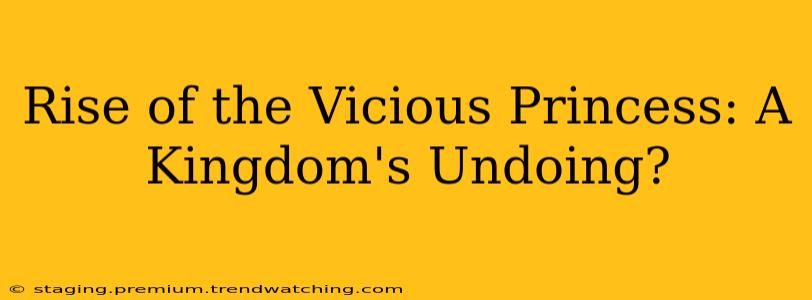The trope of the "vicious princess" – a royal heiress driven by ambition, cruelty, or a thirst for power – has captivated audiences for centuries. From Shakespearean villains to modern fantasy antagonists, this character archetype often serves as a catalyst for conflict, societal upheaval, and ultimately, the downfall of a kingdom. But what fuels this archetype? And how does the "vicious princess" narrative reflect broader societal anxieties and power dynamics? This exploration delves into the captivating and complex story of the vicious princess, examining her motivations, her impact, and the enduring appeal of her downfall.
What Makes a Princess "Vicious"?
The label "vicious" is, of course, subjective. A princess deemed vicious in one context might be seen as a strong, independent leader in another. Often, a princess's "viciousness" stems from a combination of factors:
-
Circumstances of Birth and Upbringing: A princess born into political intrigue, familial strife, or a patriarchal system might develop ruthless survival instincts. She might be forced to play a brutal game of power to protect herself and her position.
-
Lack of Agency: Historically, princesses had limited agency and control over their lives. Marriage alliances, political machinations, and expectations of obedience often left them feeling powerless. This frustration could manifest as cruel or destructive behavior.
-
Abuse of Power: Once in a position of power (through inheritance or marriage), a princess's inherent ambition, coupled with a lack of accountability, can lead to tyranny and oppression. Her actions, though driven by self-preservation or a desire for control, are often viewed as cruel and unjustified.
-
Mental Health and Trauma: In more nuanced portrayals, a princess's "viciousness" might stem from underlying mental health issues, trauma, or psychological manipulation. This adds layers of complexity to the character, making her more than just a one-dimensional villain.
Is the Vicious Princess Always the Antagonist?
While often portrayed as the antagonist, the vicious princess can also serve as a complex anti-heroine. Her actions, while morally questionable, might be driven by understandable motivations. She might be fighting against a corrupt system, challenging societal norms, or striving for a better future, even if her methods are brutal. This ambiguity adds to the intrigue and allows for a more nuanced exploration of morality and power.
What Are the Consequences of a Vicious Princess's Reign?
The consequences of a vicious princess's rule often involve:
-
Kingdom-Wide Instability: Her cruel decrees, political machinations, and disregard for her people lead to widespread unrest, rebellion, and potentially, civil war.
-
Economic Ruin: Her extravagance, wasteful spending, or oppressive taxes can cripple the kingdom's economy, leading to poverty and suffering among the populace.
-
International Conflict: Her aggressive foreign policy or strategic alliances might plunge the kingdom into devastating wars.
How Does the Narrative Reflect Societal Anxieties?
The story of the vicious princess reflects several societal anxieties:
-
Fear of Female Power: The narrative often serves as a cautionary tale about the dangers of unchecked female ambition and power. It reinforces patriarchal structures by portraying female rulers as inherently destructive.
-
Concerns About Corruption and Tyranny: The princess's reign of terror highlights the potential for abuse of power and the dangers of unchecked authority, regardless of gender.
-
Desire for Order and Stability: The princess's downfall often signifies a return to order and stability, reinforcing the need for just and benevolent leadership.
Why Does the Downfall of a Vicious Princess Remain So Appealing?
The downfall of a vicious princess is appealing because it provides:
-
Catharsis: Witnessing the comeuppance of a cruel and oppressive ruler provides a sense of satisfaction and justice.
-
Restoration of Order: The princess's downfall often paves the way for a more just and equitable society.
-
Moral Resolution: The narrative offers a clear moral message about the importance of virtue, justice, and accountability.
The "vicious princess" narrative remains a powerful and enduring archetype, offering a complex exploration of power, ambition, morality, and the consequences of unchecked authority. While often serving as a cautionary tale, the story also allows for nuanced portrayals of complex female characters grappling with challenging circumstances and exploring the blurry lines between good and evil.

